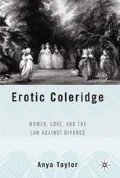Abstract
This fertile playfulness of life and verse—joyance, buoyancy, pleasure—might have gone on forever. Who does not lament the series of steps—day by day, hour by hour—that led to the caging of this free and gallant spirit? Who does not feel the encroachment of Robert Southey’s small, hard, prudential will as it bore down on Coleridge, forcing him to take his own leavings and breaking his spirit?
The Torch of Love may be blown out wholly; but not that of Hymen. Whom the flame, and its cheering Light and genial Warmth no longer bless, him the Smoke stifles—for the Spark is inextinguishable save by Death.
CN 4110
Access this chapter
Tax calculation will be finalised at checkout
Purchases are for personal use only
Preview
Unable to display preview. Download preview PDF.
Notes
Molly Lefebure, The Bondage of Love: A Life of Mrs. Samuel Taylor Coleridge: (New York: Norton, 1986), p. 32.
Mark Storey, Robert Southey: A Life (Oxford and New York: Oxford University Press, 1997), p. 7, affirms this early alliance: “there seems to have been a family understanding that it was the vivacious and beautiful Sara to whom Southey was first attracted (‘He had a friendship with mama first,’ recalled the young Sara Coleridge years later).” I thank Elisabeth G. Gitter for help in structuring the narrative of this chapter.
Richard Holmes, Coleridge: Early Visions (New York: Viking, 1989), p. 70. For formative arguments in this debate see
William Godwin’s Political Justice: A Reprint of the Essay on Property, ed. H.S. Salt (reprint 1949; London: George Allen and Unwin Ltd., 1890), pp. 100–105, and
Mary Wollstonecraft, Vindication of the Rights of Women, ed. Miriam Brody (London: Penguin Books, 1985). VRW in text.
Coleridge, “Modern Patriotism,” in The Watchman, ed. Lewis Patton (Collected Coleridge, 1970), no. III, Thursday March 17, 1796, p. 99. John Thelwall takes offense at the attack on their shared principles, and Coleridge responds in a letter of May 13, 1796, CL 1, 213.
Stephen Potter, ed. Minnow Among Tritons: Mrs. S. T Coleridge’s Letters to Thomas Poole 1799–1834 (London: The Nonesuch Press, 1934), p. vii. See for troubles
The Letters of Wiliam and Dorothy Wordsworth: The Middle Years, ed. Ernst de Selincourt and Mary Moorman (Oxford: At the Clarendon Press, 1969). MY in text.
Samuel Taylor Coleridge, marginalia to John Milton, A Complete Collection of the Historical, Political, and Miscellaneous Works, ed. T. Birch, London, 1738, cited in A Book L Value: Selected Marginalia, ed. H. J. Jackson (Princeton and Oxford: Princeton University, Press, 2003), pp. 25–27. Coleridge’s description of the souls of members of Parliament as “Souls passing thro’ the Stomach & Intestines of England, like Misletoe Berries thro’ those of the Thrush, or Nutmegs (in the Spice Islands) thro’ those of the Eastern Pigeon, in order to be matured for germinating in France & becoming Frenchmen” is a witty example of his rabid anti-gallicism as well as his delight in humorous images for the physical body.
Ernest Sirluck, ed., Complete Prose Works of John Milton (New Haven: Yale University Press, and London: Oxford University Press, 1959), 2: 229, 235, 236, 246.
Dorothy and Wordsworth describe the incompatibility of Samuel and Sara Coleridge frequently in letters to Lady Beaumont and Catherine Clarkson, e.g. The Letters of William and Dorothy Wordsworth: The Middle Years, Part 2 1806–1811, ed. Ernest De Selincourt and Mary Moorman (Oxford: Clarenden Press, 1969), 2, pp. 78–79, 84–85, 172–173. MY in text.
John Worthen, The Gang (New Haven: Yale University Press, 2002);
Henry Crabb Robinson, The Diary of Henry Crabb Robinson, ed. Devek Hudson (London: Oxford University Press, 1967), p. 47; HCR in text;
Sara Hutchinson, The Letters of Sara Hutchinson 1800–1835, ed. Kathlen Coburn (London: Routledge & Kegan Paul, 1954), p. 324; SHL in text.
Edith Coleridge, ed., Memoir and Letters of Sara Coleridge (New York: Harper & Brothers, 1874), pp. 40–41.
Bradford Keyes Mudge, Sara Coleridge: A Victorian Daughter: Her Life and Essays (New Haven and London: Yale University Press, 1989), describes her neglect by and adoration of her father.
Judith W. Page, Wordsworth and the Cultivation of Women (Berkeley and London: University of California Press, 1994), describes his “three wives” in his assembly line of copying and recopying his poems, and concludes that “throughout his career Wordsworth sympathizes with female characters and cares deeply about the women in his life, but he is never really able to enter into another consciousness with what Keats referred to … as ‘negative capability’” (p. 163).
Percy Bysshe Shelley, “Peter Bell the Third,” part four, 11. 314–317, 331, Shelley’s Poetry and Prose, ed. Donald H. Reiman and Sharon B. Powers (New York and London: W.W. Norton & Company, 1977), p. 335.
Beth Darlington, ed., The Love Letters of William and Mary Wordsworth (Ithaca, New York: Cornell University Press, 1981), pp. 229–230. But the heat in these letters is ringed by a coldness toward others; Wordsworth seems almost pleased to be able to tell his wife that Coleridge “has a world of bitter enemies, and is deplorably unpopular … But you cannot form a notion to what degree Coleridge is disliked or despised notwithstanding his great talents, his genius & vast attainments” (May 17–18, 1812; p. 163). I thank Marilyn Gaull for suggesting the parallel sexualities of Wordsworth and Coleridge.
Copyright information
© 2005 Anya Taylor
About this chapter
Cite this chapter
Taylor, A. (2005). The Smoking Torch of Hymen. In: Erotic Coleridge. Palgrave Macmillan, New York. https://doi.org/10.1057/9781403979179_3
Download citation
DOI: https://doi.org/10.1057/9781403979179_3
Publisher Name: Palgrave Macmillan, New York
Print ISBN: 978-1-349-53115-8
Online ISBN: 978-1-4039-7917-9
eBook Packages: Palgrave Literature & Performing Arts CollectionLiterature, Cultural and Media Studies (R0)

